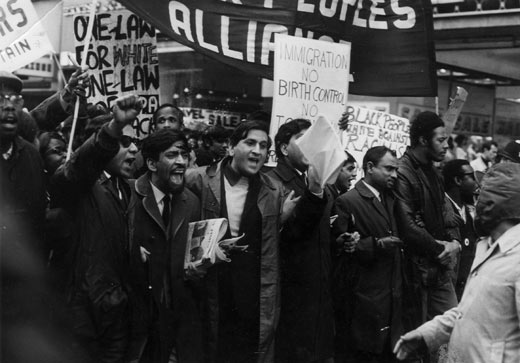
Social Justice in Birmingham
The black presence in Birmingham increased dramatically during the twentieth century with the advent of commonwealth migration after the Second World War. On arrival, migrants encountered a social landscape that was not always welcoming and they were faced with discrimination as they tried to find homes, gain employment and educate their children. Added to this, the experience of hostility and abuse from the 'host' community as well as legislation stemming black migration meant that in Britain black people were far from being treated as equal citizens.
In Birmingham both migrant and host communities alike were concerned about the injustices facing migrants and recognised that action needed to be taken in order to improve social conditions in the city. Instead of being passively accepted, injustice and intolerance were actively resisted and confronted by many people in Birmingham, both black and white.
The two case studies presented is this section of the learning package demonstrate contrasting approaches to campaigning for social justice in Birmingham during the 1960s and 70s. The Indian Workers Association was a politically driven campaigning organisation, formed by Indians, which struggled for the empowerment of black and working class people. The Sparkbrook Association, which was headed by representatives of the white 'host' community, centred its activities on the provision of welfare services which enhanced the living experiences of the local community.
Both organisations, although vastly different in approach and output, shared the same goals of bringing about racial equality and better conditions for all to live, work, play and learn in Birmingham. Whilst the social inequalities these organisations fought against still exist today their examples demonstrate the strength of collective action in effecting positive change in the city.
The case studies represent only two examples of the many organisations that were involved with social justice campaigning in Birmingham at the time. Organisations such as the Pakistani Workers Association, the Kashmiri Workers Union, the Afro-Caribbean Self-Help Organisation, Harambee and the Pakistani Welfare Association amongst others have campaigned on equality-related issues affecting Birmingham's diverse community. Due to limitations on space, this learning package concentrates on collections currently held by Birmingham City Archives. Through your own research however, you may start to uncover the hidden histories of the other individuals and organisations that have struggled for justice and equality in the city.
The learning package provides a starting point for learning about campaigning for social justice in Birmingham and beyond. It will show you how archival material can be used to both stimulate ideas and research, and to make connections between the various campaigns for human rights that have become embedded in the past and present of Birmingham's communities.
Read on, and you will find out how the IWA and the Sparkbrook Association
provide inspiration for the continuing struggle for social justice
today.
Author: Sarah Dar
Image: copyright Birmingham Post & Mail. Indian Workers Association on Black Peoples Alliance Protest March, 1960s [Birmingham City Archives: MS 2141/Digital Images]
|